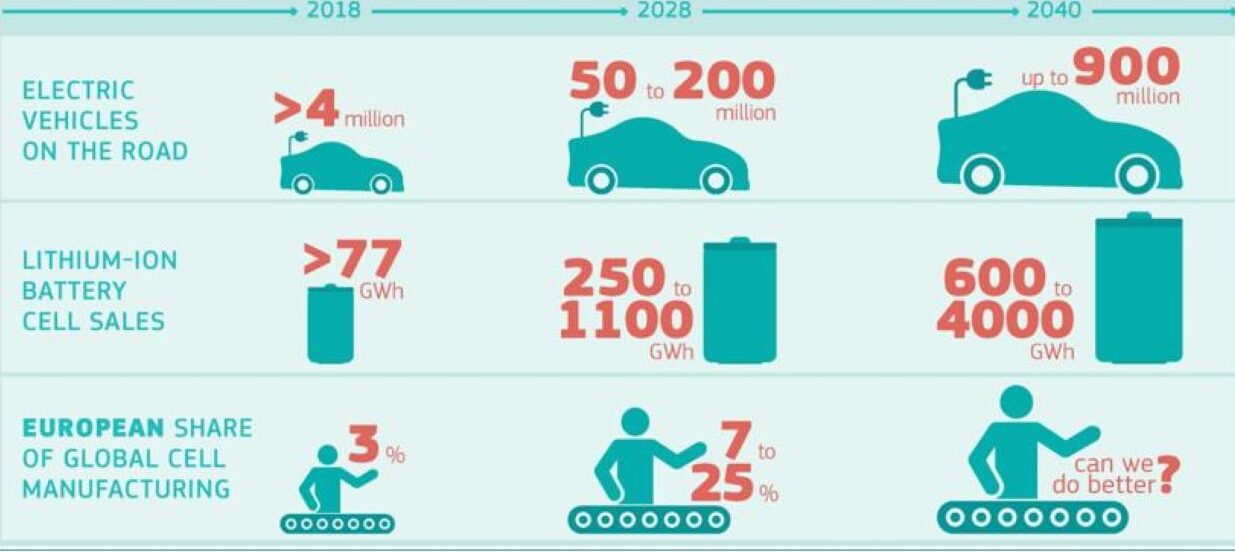Brussels, 21 March 2024
The EU together with the Kingdom of Norway signed a Memorandum of Understanding (MoU) launching a strategic partnership to develop sustainable land-based raw materials and battery value chains. This is an important building bloc and another tangible result of the EU-Norway Green Alliance, announced by Commission President Ursula von der Leyen and Prime Minister of Norway Jonas Gahr Støre in April 2023.
The MoU was signed by Maroš Šefčovič, Executive Vice-President for the European Green Deal, Interinstitutional Relations and Foresight of the European Commission, and Jan Christian Vestre, Minister of Trade and Industry of the Kingdom of Norway.
The new partnership offers a comprehensive framework for future-oriented and long-term cooperation between the EU and Norway in the area of two value chains of strategic importance. Supported by geographical vicinity, their closer integration can help decrease the risks of trade disruptions, while increasing overall competitiveness of our economies and creating high-quality jobs.
The signature coincides with the 30th anniversary of the European Economic Area Agreement, which ensures Norway’s participation in the Single Market and forms a cornerstone for our relations. It further demonstrates their potential.
Five areas of cooperation
This MoU establishes close cooperation between the EU and Norway in the following five areas:
- Integration of raw materials and batteries value chains, by facilitating joint investment projects through joint ventures, consortia, special purpose vehicles and other forms of cooperation by industrial actors, including linking final users with raw materials suppliers.
- Cooperation on research and innovation (R&I), while results from joint projects will provide a good basis for potential industrial uptake and implementation. Norway was very active in EU Framework Programme for R&I – Horizon 2020 and continues to do so under the current Horizon Europe.
- Application of high environmental, social and governance standards and practices will be facilitated through mutual consultation and exchange of information on relevant policies and initiatives along the entire value chains, including recycling and waste management.
- Mobilisation of financial and investment instruments to support investment projects under the Partnership, notably through Invest EU, the European Raw Materials Alliance and the European Battery Alliance.
- Developing necessary skills for high-quality jobs in raw materials and battery sectors. This includes mobilising stakeholders and financial support for the development and deployment of adequate initiatives and the uptake of existing ones like the European Battery Academy.
Next Steps
Following the signature of the MoU, the EU and Norway will jointly work with stakeholders on implementing the Roadmap for the Partnership. As a first activity, a business match-making event is planned during Hannover Messe on 22 April.
Background
The partnership on raw materials and batteries is one of the building blocks of the EU-Norway Green Alliance, signed in April 2023, with the objective of strengthening joint climate action, environmental protection efforts, and cooperation on the clean energy and industrial transitions.
It is beneficial to both parties, helping to achieve the green and digital transitions. In practice, it will support developing sustainable supply chains between both sides and enable furthering environmental, social and governance standards as well as exchange of knowledge on raw materials.
Norway is a mineral rich country with rare earths, magnesium, titanium, vanadium, phosphate rock and other resources under consideration. It also has a large processing capacity for many raw materials. In the past years, the battery sector has been growing significantly, with many new ventures across the full value chain.
The EU has a well-established and growing market for green technologies, like batteries, with an estimated demand in 2023 of 175 GWh that offers many opportunities for offtake agreements, joint ventures and joint R&I projects. The EU battery industry is the second largest in the world with existing facilities having up to 220 GWh of ramp up capacity and an additional 1 TWh of battery manufacturing projects has been announced or are currently under construction. Additionally, the EU is developing its potential in critical and strategic raw materials offering opportunities for collaboration with Norwegian partners.
With critical raw materials being an essential prerequisite for delivering on green and clean energy objectives, the Commission has –as part of the Action Plan on Critical Raw Materials- started to build a series of partnerships on raw materials with Canada and Ukraine in 2021, Kazakhstan and Namibia in 2022, Argentina, Chile, Zambia, the Democratic Republic of Congo and Greenland in 2023, and Rwanda in 2024.
These partnerships allow both sides to advance trade and investments into a secure, sustainable and resilient raw materials value chain, which is key to achieving the transition to climate-neutral and digitalised economies. The partnerships are in line with the Global Gateway strategy, the EU’s key initiative for investments for sustainable and high-quality projects in the world, taking into account the needs of partner countries and ensuring lasting benefits for local communities, and through which the EU will mobilise up to €300 billion.
More information
Quote(s)
We are bringing cooperation between the EU and Norway to another level, as today’s signature is of strategic value. It will create a wide range of business and research opportunities on both sides, strengthening both our industrial base and our political bond.
This partnership boosts further the EU’s strong Single Market relations with Norway. It allows to reinforce our economic ties and strategic value chains for the green and digital transition. Together, we pave the way for a more resilient economy, ensuring the supply of critical raw materials and manufacturing of batteries for Europe’s jobs and growth.
Link – EU Commission

